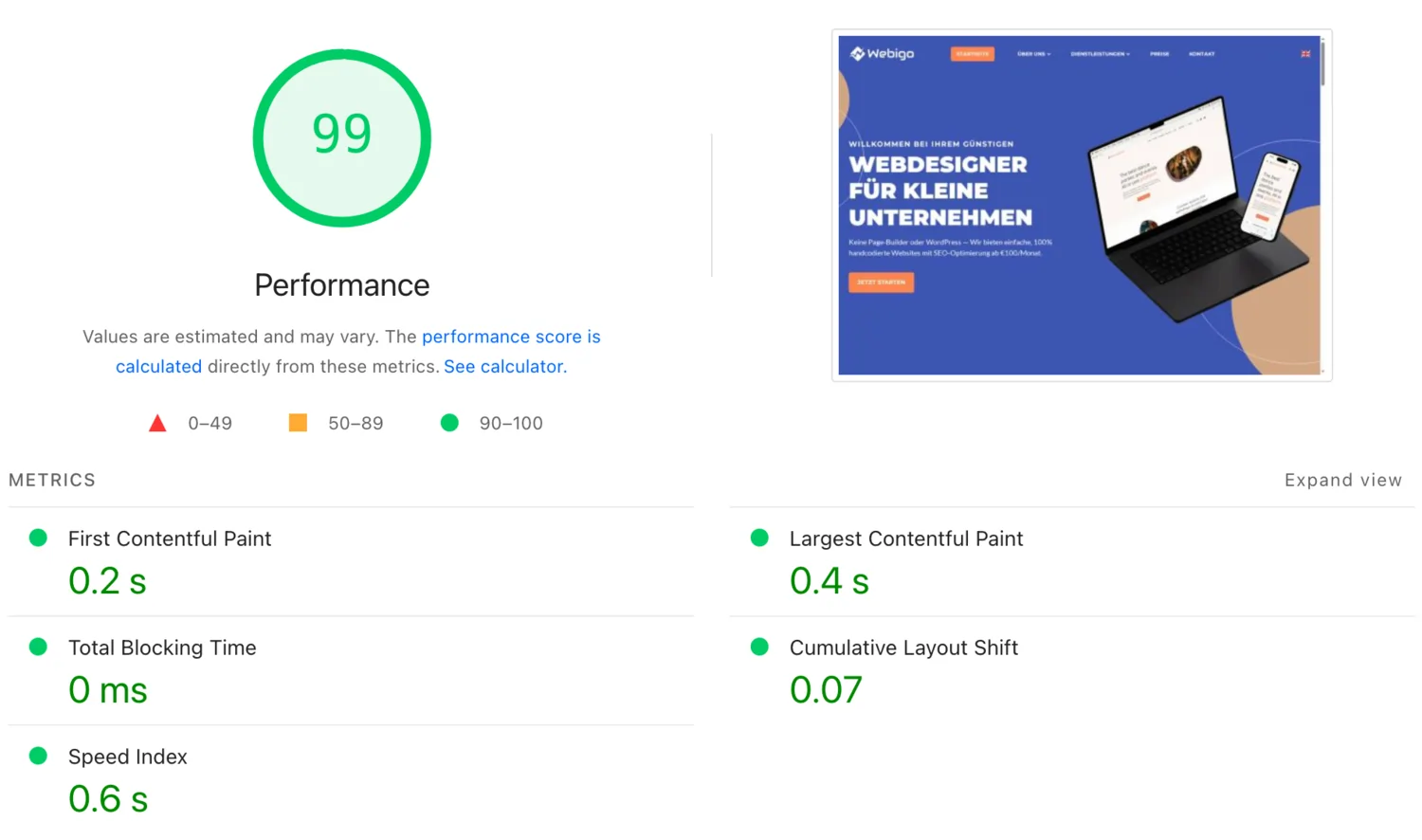
Why Hand-Coded Websites Outperform Page Builders
Nowadays, websites can be created with a variety of tools: WordPress, Wix, Webflow, Jimdo, ... you name it! However, not every tool fits every customer's needs. Sometimes a simple hand-coded website is all you need. And I would argue, that's what most small businesses should opt for. Here's why! In this article, I’ll break down the key differences, highlight pros and cons, and help you figure out which approach is best for your goals.
Static vs. Dynamic Websites: What’s the Difference?
Before I make my point, we must first understand the fundamental difference between a hand-coded (i.e. static) and page builder (i.e. dynamic) website.
- A static website consists of pre-built HTML, CSS and JavaScript files that are directly delivered to your browser by a server. At Webigo, we specialize in creating static websites with clean, fast, and secure code tailored to your business needs.
- A dynamic website is generated by the server each time it's requested by your browser. Page builders such as WordPress and Wix typically store both content and code in a database. Whenever someone accesses the site, the server retrieves the necessary data from the database, assembles the webpage on the fly, and then delivers it to the user's browser.
Is Every Hand-Coded Website Static?
Not necessarily. A hand-coded website can be static, dynamic, or a combination of both—it depends on how it’s built. For example, an e-commerce site can be entirely hand-coded, but it would still be considered dynamic, as it relies on the server to generate and deliver content based on user interactions, product data, or inventory. While there’s more nuance to this topic, the key takeaway is that static sites are generally favored for their performance, simplicity, and security — which we’ll now explore.
Why Static Websites Are More Secure
Did you know that 90% of all hacked sites are WordPress? A frightening number, I know. Given that WordPress is powering almost 45% of the internet, it's an easy target for many hackers as owners neglect their website's security over time. Platforms like Wix and Webflow are not immune to hacking, yet such occurrences are significantly less common since the companies operating these platforms are actively securing it.
Why Static Sites Are Harder to Hack
While not entirely "unhackable," static hand-coded websites are significantly more difficult to compromise. As a site grows in complexity — with more moving parts, third-party plugins, or backend systems — the risk of exploitable bugs increases. This is especially true for platforms that rely on a central server and a connected database, as is common with most page builders.
Our hand-coded websites don’t connect to a database at all, reducing the attack surface. Additionally, they are served via Content Delivery Networks (CDNs) — a distributed network of servers — which adds redundancy and an extra layer of protection in case a server fails or is targeted.
Website Speed and SEO: Why It Matters
Due to their dynamic nature, platforms like WordPress, Wix, and other page builders are generally slower than hand-coded websites. Unlike static sites, which serve pre-built files instantly, dynamic sites must generate content on the server each time a page is requested. This process can add several hundred milliseconds, or even full seconds, to the load time. Additionally, extending functionality through plugins often slows the site further, as each plugin introduces extra processing overhead with every request.
Why Google Punishes Slow Websites
Google has found that 53% of visitors would abandon a website if a mobile site takes longer than 3 seconds to load. Their primary goal is to ensure users find the content they're looking for. When someone quickly leaves a website after arriving from a search result, it signals to Google that the content may not be relevant or engaging—something that can negatively impact the site's ranking.
This leaves us with two conclusion:
- Visitors prefer fast websites. A slow-loading site can quickly frustrate users, causing them to leave before engaging with your content.
- Google prioritizes speed. If you want to rank on search engines, a fast-loading website is essential.
How to Know If Your Website Is Fast Enough
Google offers a tool called PageSpeed Insights, where you can enter your website URL and see how Google evaluates its performance, particularly in terms of speed. A score close to 100 indicates that your site loads quickly and performs well, which can improve user satisfaction and improve your SEO.
At Webigo, we specialize in building high-performance websites. Ours typically load in under one second, ensuring both speed and satisfaction for your visitors.

Customization and Creative Control
If you’ve ever used a page builder, you’ve likely encountered limitations when trying to fully translate your creative vision into a website. This is an inherent trade-off with page builders: the more flexible they aim to be, the more complex they become—often at the expense of ease of use. Tools like Webflow and Framer offer more advanced design capabilities, but they can be overwhelming for the average user.
Hand-coded websites take this a step further. While they require a higher level of technical expertise, they offer unparalleled control and virtually unlimited creative possibilities. A skilled developer takes care of the implementation, transforming your vision into a website designed to engage visitors and convert customers.
Ongoing Maintenance: A Hidden Cost
WordPress holds a unique position among page builders — it requires continuous maintenance. While more powerful and customizable than Wix, Jimdo, or Webflow, WordPress-based sites need regular updates for plugins, themes and more. If neglected, these updates can become security risks or break your site entirely.
By contrast, hand-coded websites are typically made up of simple HTML and CSS files. No backend software to patch. No plugins to maintain. Fewer headaches.
TL;DR – How to Choose the Right Type of Website
While this article highlights the many advantages of hand-coded websites, that doesn't mean they’re the best fit for everyone. Here’s a practical way to decide:
- Have a budget and want a professional online presence? Hire a developer to create a custom, fast, and reliable site. This will save time, bring in more customers, and eliminate maintenance stress.
- On a tight budget or need to launch quickly? Page builders like Wix, Webflow, and Jimdo are great for getting started. Just be aware of their limitations in speed, flexibility, and SEO.
- Need complex features like user logins, or e-commerce? Consider WordPress — but only if you’re ready for the ongoing updates and learning curve.
Still unsure? Reach out — we’ll help you choose the best option for your business.

